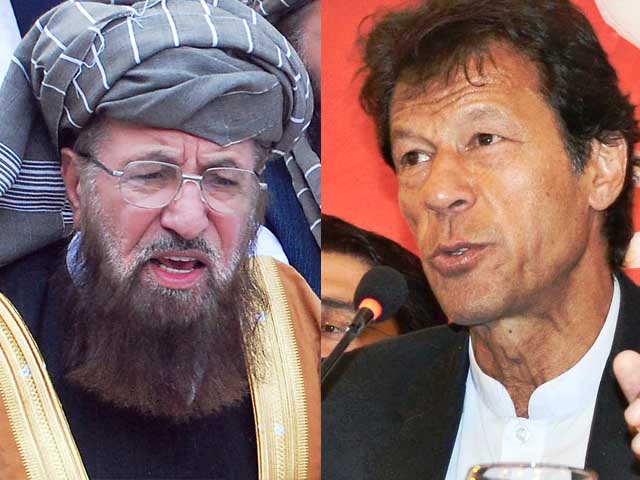
The political party approached Sami Ul-Haq, nicknamed the "Father of the Taliban", after emerging from elections as the largest party in the troubled northwestern province of Khyber Pakhtunkhwa.
K-P is on the frontline of a nearly seven-year domestic Taliban insurgency and suffers near-daily bomb and shooting attacks blamed on militants.
Party chairman Imran Khan has called for an end to military operations and peace talks with the Taliban, making his party's victory in the northwest a significant development.
Imran has vowed to put together a provincial coalition government in Khyber Pakhtunkhwa and turn it into a "role model" for the rest of the country.
"We will talk to all stakeholders for establishment of peace in our province, meeting with Maulana Samiul Haq was a part of that," Shaukat Yousafzai, a party leader who won a seat for the party in the provincial assembly told AFP.
Samiul Haq is chief of his own faction of the religious Jamiat Ulema-e-Islam (JUI-S) party and runs a madrassa that educated several Taliban leaders.
Yousafzai said a PTI delegation led by Pervez Khattak, the incoming provincial chief minister, met Samiul Haq late Monday.
Hamidul Haq, the cleric's son and a former MP, confirmed to AFP that PTI leaders came to seek support.
"They asked Samiul Haq to play his role in establishment of peace in the province," Haq said. "Samiul Haq told the delegation that he will play his role in establishment of peace and initiation of peace talks."
Pakistan's incoming prime minister Nawaz Sharif on Monday said he was open to talks with the Taliban, saying bringing peace was one of his top priorities.
Pakistan's umbrella Tehreek-e-Taliban (TTP) movement in February signalled its willingness to enter peace talks with the government but also stepped up attacks against Sharif's rival Pakistan People's Party and its main allies, drastically curtailing their ability to campaign during the election.
Previous Pakistani governments, as well as the military, have forged ad hoc peace deals with insurgent factions in various parts of the northwestern tribal belt, which have often broken down quickly.
The Taliban, who denounce democracy as un-Islamic, killed more than 150 people during the election campaign, including 24 on polling day itself.
Taliban spokesperson Ehsanullah Ehsan had said the insurgents would "wait until political parties form their government" but told AFP before the polls that anyone who "comes into conflict with Islam" would be targeted.
Suicide, bomb and gun attacks blamed on Taliban and al Qaeda-affiliates have killed nearly 6,000 people since July 2007, according to an AFP tally.
COMMENTS (10)
Comments are moderated and generally will be posted if they are on-topic and not abusive.
For more information, please see our Comments FAQ

















Query - what happens if the peace deal IK reaches isn't suitable to Sharif? Wouldn't it make more sense to have negotiations done at a Federal level since the victims/stakeholders of these terrorist are nationwide? IK negotiating as PM is one thing - but he's not PM.
@Mj, but afghan taliban have not approved TTP actions either so it's unfair to hold them responsible.
at last the better senses prevailed....go ahead guys....make peace. enogh innocent blood has been spilled....
@Mj: Please correct yourself. The afghan taliban immediately denounced Pakistani Taliban after their formation.
IK never speaks against the 45,00 or so killed by Taliban...He only wastes nation's time on attacking the "bhai" in London.. Why doesnt he also talk peace with the parties in Karachi.. Double Standards!
Whatever works. Go for it. Better than doing nothing.
@Sigh: There is little difference between the two. The aghan talibans have never denounced terror attacks in Pakistan. It makes them complicit in the war crimes of its sister group;.
Very positive steps from PTI in right direction. SamiulHaq Jamia Haqania in Akora Khattak (Nowshera) is one of the reknowned and very privileged madrassa in Asia ... Decision of above said Madrassa is well respected in complete Pushtun belt from KP to Afghanistan ... Famous Afghan taliban leader Jalaludin Haqqani and 1000s of talibans remained student of this madrassa ...
Negotiation is last solution to get peace in KPK ... after peace deal with Taliban we can better cope with so-called bomb blast blamed upon taliban ... (A real talib cant even think to do bomb blast in mosque - referred to 02 bomb blast in Malakand region mosque in last week) In the end a piece of quote to people who are against peace / negotiation deal with taliban in KPK
A man convinced against his will is on his opinion still
Why don't you also mentioned that PMLN has already contacted Maulana Sami Ull Huq, he was on tv all day yesterday talking abt it?
Either put on the front page you only allow comments that are anti-PTI & Anti-Pak or stop telling us abt freedom of speech.
Good step by PTI. Also Samiul Haq is pro-Afghan Taliban not Pro-TTP. Don't try to confuse.